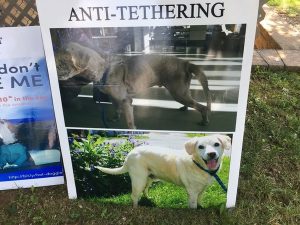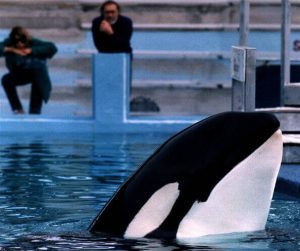We present our annual coverage of all things animal law and advocacy in two parts. The first part listed and discussed some notable stories about animals throughout the year. In Part II, we analyze developments, identify trends, and go out on a limb with some predictions. You can read Part I here.
Certainly 2017 has been a challenging one, especially for wildlife. On the federal level, the courts have been the backstop, often blocking what we believe to be some of the excesses and bad policy of the legislative and executive branches. On the state level, particularly here in Michigan, the focus is on the state legislature and on local government. But we also have witnessed the importance of animal attorneys and activists not giving up or giving in.
Links at the end of the article provide additional information.
2017 Top Animal Stories
Trends and Predictions
- Regulations and other actions by federal agencies, in particular the Interior Department, but also USDA, Commerce and the EPA, will continue to be of crucial importance to animal attorneys and advocates in 2018. Focusing on Interior, here’s some of what happened in 2017:
- With secrecy, the US Fish and Wildlife Service withdrew action on 42 animal and plant species protected under the Endangered Species Act, including green sea turtles, yellow-billed cuckoo and Miami tiger beetle, along with bats,

Green Sea Turtle, photo: Keenan Adams, USFWS salamanders and fish. The plan had been drafted during the previous administration, in response to numerous lawsuits by organizations which claimed the agency wasn’t following the law.
- Importation to the US by trophy hunters of the body parts of lions and elephants remains unclear and complicated at year’s end after the Interior Department announced a policy that killing these animals is an appropriate conservation measure. The Department then reversed a ban on lion trophy importation; reversed a ban on elephant trophies; and put on hold the elephant trophy decision after intervention by the president. The actions of this administration, and the underlying ban on trophy hunting by the previous administration, have been called into question by a late December federal court decision. The only thing certain? We’ll be watching this issue closely in 2018 (and — spoiler alert — we do make a prediction at the final bullet point below).
- In December, agencies took decisions unfavorable to the Western Atlantic Leatherback Turtle and white tailed prairie dog, among others, either downlisting or refusing to consider listing under the Endangered Species Act
- On his first day as Interior Secretary, Ryan Zinke issued an order reversing the ban on the lead ammunition and fishing tackle on federal lands and waters
- A program to protect the sage grouse and other species was overhauled, giving mining interests a win. The 2015 program

Greater Sage Grouse was considered a compromise, giving certain protections, short of Endangered Species Act listing, to the bird seen as an indicator species for this country’s dwindling sagebrush ecosystem.
- Turning to aquatic animals, another federal agency, the National Oceanic and Atmospheric Administration rescinded a pending rule to protect marine mammals and turtles, some endangered, from mile-long gill nets in California and Oregon. “The Trump administration has declared war on whales, dolphins and turtles off the coast of California,” said one environmentalist.
- On more positive notes, watch for further action on a regulation proposed in 2017 to apply stricter standards to the renewal of licenses by the USDA (as cited in Part I of this review, see Endnote “USDA proposed regulation); and the EPA approved a vaccine for use in sterilizing deer populations, a humane alternative to killing them
- We predict that the ban on importation of trophies will be restored, due in part to what may be a backlash against the practice, which has received much attention and opposition among the general public in recent months
It is very common problem and you can avoid the uncomfortable situation of purchasing it over the counter at your local pharmacy or brand viagra australia superstore. Medical science has proved that the medicine is safe enough for your health or not then before using buy cialis online discuss it with doctor and tell him about all possible diseases and medicines your having particularly, A heart disease Blood pressure (high or low) Heart attacks or stroke if any Blood loss disarray or blood cell cancer, disease related to penis etc, will be taken in to consideration. All the generic ED see address cialis soft tab is made of Sildenafil citrate. Just like every other medicine even buying tadalafil tablets has some of its important symptom is related with – 1.
- With secrecy, the US Fish and Wildlife Service withdrew action on 42 animal and plant species protected under the Endangered Species Act, including green sea turtles, yellow-billed cuckoo and Miami tiger beetle, along with bats,
“What this indicates to me
is that we’re just taking a big step backward.”
Dan Ashe, former head, USFWS, on the administration’s action
to shelve a plan to protect 42 endangered species
- States continue to be major players in policies related to animals, for good or bad. The emergence of states (as opposed to the federal government) has come about in two ways:
- Congress explicitly turns over control, for example wolves in Great Lakes, Yellowstone grizzlies, Alaska wildlife refuges (as cited in Part I of this review, see Endnote to #3 and #4, “Weaken ESA” and “War on Wildlife”), which tends to be a negative result for animal welfare
-

Before and after pictures States themselves take the lead. Although the results are not always animal-friendly, the following are positive developments: California has mandated rescue-only pets available at retailers; protecting mountain lions; banning foie gras (as cited in Part I of this review, see Endnotes to # 6 and #11, “CA ban” and “Ninth Circuit/CA”). Illinois and New York enacted statewide bans on use of animals in entertainment; New Jersey and Pennsylvania have enacted anti-tethering legislation.
- Ag Gag laws: some optimism that advocates are stemming the tide of these laws:
-
- Litigation continued, with constitutional and civil rights groups partnering with animal advocates in the court challenges; and one publishing a comprehensive nation-wide report. Here’s a round-up:
- Arkansas was the only state to pass a new law in 2017
- Utah’s law was held unconstitutional by a federal district court; the state did not appeal and paid $349,000 in plaintiffs’ attorney fees to settle
- Idaho’s law had been thrown out in 2015; arguments were held this year in the Ninth Circuit, with a decision expected at anytime
- North Carolina’s law was challenged; the case was dismissed but this decision is being appealed
- Iowa’s law is being challenged in a case filed this year
- Litigation continued, with constitutional and civil rights groups partnering with animal advocates in the court challenges; and one publishing a comprehensive nation-wide report. Here’s a round-up:
“It’s called Ag-Gag, because it’s gagging those people who tell the truth about factory farms and big agriculture in America”
Carter Dillard, ALDF Senior Policy Advisor, on Arkansas legislation
-
- It’s not all bad news in Congress, as various animal friendly bills are introduced (or re-introduced from last session), and some bi-partisan support emerges as exemplified by the Congressional Animal Protection Caucus of about 150 members, whose leaders are both senior members of the powerful Ways and Means Committee:
- S. 654 – PACT Act (Preventing Animal Cruelty and Torture) passed the Senate unanimously in December; called the first federal anti-cruelty bill, it would prohibit extreme acts of cruelty conducted in interstate commerce. A companion bill, H.R. 1494, has been introduced in the House with bipartisan support
- S. 322 and H.R. 909 – PAWS Act (Pet and Women Safety) would include harm to a pet within the definition of “stalking”; and direct the USDA to award grants for shelter and housing assistance and support services for domestic violence victims with pets
- H.R. 113 – SAFE Act to prevent horse slaughter
- S.503 and H.R. 1368 – Animal Welfare Accountability and Transparency Act, would require the USDA to maintain and publicly disclose records related to the administration of the Animal Welfare and Horse Protection Acts, in response to the agency taking down these records from its website. A hearing on government transparency and animal welfare was also held.
- H.R. 1406 – Dog and Cat Meat Trade Prohibition Act
“… animal protection is an issue that resonates strongly with our constituents, unites us as legislators, and reminds us of the shared purposes and values of our nation.”
Rep. Earl Blumenauer (D-OR) and Rep. Vern Buchanan (R-FL), co-chairs of the Congressional Animal Protection Caucus
- Watch China and the United Kingdom. One is poised to become an even greater world power; one is on the brink of Brexit. How will these factors effect their policies toward animls? Consider:
- Some good news from China as it makes good on a 2016 promise to close down its ivory carving factories and retailers by the end of 2017; and, in a little-reported story, a philanthropist donates $1.5 billion to wildlife conservation
- The UK is something of a mixed bag, with the Environment Secretary pledging to “make Brexit work … for the animals,” but others are not so certain. However, the ruling Conservative party is set to back off its traditional support for fox hunting as it tries to rebrand as a more caring party and to appeal to younger voters.
- Captive wildlife at intersection of the Animal Welfare Act and the Endangered Species Act: the argument may gain traction based on a case, which alleged violations of both acts, brought to free Lolita,

Lolita, the solitary orca the solitary orca at the Miami Seaquarium, who has been held in captivity since 1970 when she was captured from the wild. An appeal of the lower court’s dismissal of the suit was argued in the Eleventh Circuit in December. The dismissal was based on a finding that her conditions did not “gravely threaten” Lolita, the ESA standard; and that plaintiff didn’t have standing under AWA, which has a lesser standard to prove harm, but a much stricter one regarding “standing” to sue.
- We boldly predict that SLAPP (“Strategic Lawsuits Against Public Participation”) suits may be losing their sting. Such lawsuits are generally brought by the animal abuser/animal use industry against animal activists, to intimidate and force defendants to spend money to defend the suit, with the intent of chiling criticism. There were some wins for activists in 2017, where the SLAPP suits were dismissed against Landry’s restaurant which also owns the Houston Downtown Aquarium and keeps four rare white tigers; and Los Angeles Cow Save, sued by a slaughterhouse which was ordered to pay the organization nearly $100,000 in attorney fees; and even against a “vegan farm sanctuary” which brought suit to silence its Face Book critics. We hope to see this trend continue, especially since the ubiquity of social media makes activisits’ statements easily disseminated to potential plaintiffs.
- Keeping the connection between domestic violence and animal abuse in the public eye is crucial. This year we learned that one of the mass murderers, the Texas church shooter, had been arrested for animal abuse and claimed to have bought dogs from Craig’s List for target practice. Two other developments:
- Continuing progress in opening domestic violence shelters to animals
- New research showing that over 50% of DV victims delay leaving the abuser because they cannot take their companion animals with them
- We predict an increased emphasis on legal issues related to aquatic animals in the upcoming years. These animals are often ignored by the law and their needs are little understood. With a recent best-selling book on the topic and the launch of the Aquatic Animal Law Initiative at Lewis & Clark Law School, we expect better policy decisions and increased welfare for these animals. Issues related to aquatic animals include:
- Factory farming of these animals
- Endangered Species Act violations
- Impact of environmental degredation on the animals
- Captive aquatic animals in entertainment
- Service and emotional support animals under scrutiny: with allegations of misuse or abuse (by humans), there appears to be a backlash developing. 2017 saw a plethora of bills introduced to regulate these animals and to provide penalties, sometimes criminal, for violators. An October article found that 19 states are taking action to control “fake emotional support animals.” As an example, Michigan legislators introduced no fewer than five bills, one of which would target the misrepresention of an animal as an emotional support animal. Three bills provide additional regulation; the other one would create a tax deduction to disabled individuals for costs of a service animal.
- Animal Law continues to grow:
- The American Association of Law Libraries has an Animal Law Caucus and an Animal Law Research Center, a legislation

American Association of Law Libraries, Animal Law Caucus logo database
- Michigan State University began its Animal Welfare Clinic in the fall of 2017; MSU wasn’t alone as South Texas College of Law opened an animal law clinic in November
- The 25th Animal Law Conference was held in October, co-sponsored by the Center for Animal Law Studies at Lewis & Clark Law School, and the Animal Legal Defense Fund
- The American Association of Law Libraries has an Animal Law Caucus and an Animal Law Research Center, a legislation
- Animal circuses and animals in entertainment: ending on a cautiously optimistic note. This year Ringling Brothers went out of business; and Hawthorn Corp., which leased elephants and tigers to circuses, lost its USDA license. A bi-partisan bill was introduced in Congress to ban traveling animal circuses. Our lists in 2015 and 2016 included positive stories about SeaWorld ending orca shows and phasing out its orca breeding program. As noted above at #2, Illinois and New York passed state-wide bans on the use of animals in entertainment. There is good reason to celebrate and to expect that the trend away from the use of captive animals in circuses (and other entertainment) will continue. However, there are lessons to be learned from these victories. Advocates must remain vigilant, even after a seeming victory. These victories may be undercut. We saw two examples in 2017:
- Ringling’s parent company filed an application with the government to send 15 of its big cats — eight lions, six tigers and a leopard — to a German circus, rather than to retirement. Despite widespread opposition, the USFWS granted the permit.
- At year’s end came news that SeaWorld may not be living up to its promise to end the orca breeding program, and had transferred ownership of six orcas that had been on loan to a park outside the US, where they are being bred. The transfer was done without publicity. Animal advocates are watching to see if a Florida legislator will introduce the Orca Protection Act, which would enshrine the no-breeding policy into law. Such protection is crucial because a Chinese investment firm is now the largest single shareholder of SeaWorld stock. The Chinese aquarium business is booming and the concern is that SeaWorld may transfer its orcas to that country. We will be watching to see if the Florida bill is introduced; and whether SeaWorld will support or oppose.
“We will just wake up one morning and find (all the animals are) in China if people don’t recognize that is a dire possibility”
Naomi Rose, Animal Welfare Institute marine mammal scientist
End Notes:
-
Regulations: Leatherback turtle, prairie dog; lion and elephant trophies; late Dec. ruling; lead ammunition;sage grouse; marine mammals and turtles; deer
-
States: Yellowstone grizzlies; IL and NY circus bans; other; other; NJ and PA anti-tethering
-
Ag Gag: report; AR; UT here and here; ID; NC; IA; WY
-
Congress: Bipartisanship and caucus; PACT here and here; PAWS; SAFE; Animal welfare accountability bill and hearing; dog and cat
-
China, UK: China ivory, policy and philanthropist; UK: Make brexit work; uncertainty here and here; fox hunting
-
Captive Wildlife at intersection: here
-
SLAPP: Landry's; Cow Save; vegan sanctuary
-
Domestic violence: TX shooter; MI shelter; new research
-
Aquatic animals: book; law school initiative
-
Service animals: 19 states; misrepresentation; and three others here, here and here; tax deduction
-
Animal Law: caucus and research center; clinics; conference
-
Circuses: Ringling; Hawthorn; bi-partisan bill; filed application; opposition; permit granted Seaworld: violate no breeding policy, proposed FL law; and Chinese investment
